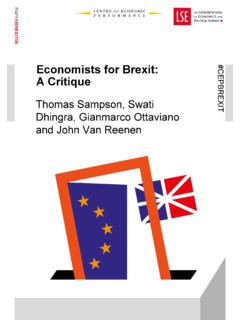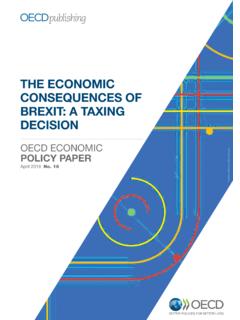Transcription of BREXIT: the impact on the UK and the EU - Global …
1 Global Counsel 2015 BREXIT: the impact on the UK and the EU June 2015 Global Counsel 2015 PrefaceFor the majority of businesses in Britain the possibility the UK might leave the European Union brexit is a major source of concern. Both the break with the EU and the uncertainty associated with it would be bad for business and damaging to the UK economy. A great deal has now been written on the economic consequences for the UK of brexit . Some of this is impartial; much of it is partisan. Very little has been written on the consequences for the rest of the EU. This report seeks to address this gap by systematically assessing the evidence on the impact of brexit on both the UK and the rest of Europe.
2 At the heart of this analysis are ten distinct channels of impact . For each we consider in turn the impact on the UK and on the rest of the EU. We also assess the specific ways in which different member states are exposed through these conclude that while the biggest impact of brexit would be on the UK, there can be little doubt that there will also be a significant impact on the rest of the report has been prepared by Global Counsel based on our interpretation or the politics of brexit and our analysis of the best available economic evidence. Gregor IrwinChief Economist, Global Counsel2 About Global CounselGlobal Counsel helps businesses across a wide range of sectors anticipate the ways in which politics, regulation and public policymaking create both risk and opportunity.
3 We also help businesses to develop and implement strategies to meet these challenges. The firm was founded in 2010. Our senior team are former public policymakers who have worked at the highest level in the British government and European Union institutions. They draw on decades of experience and are backed by a Global author of this report is Dr Gregor Irwin, Chief Economist of Global Counsel. Dr Irwin was the Chief Economist of the foreign and Commonwealth Office from 2008 to 2013 and a Director of the FCO from 2011 to 2013. He has previously held senior positions at the Bank of England and HM Treasury. Global Counsel 2015 Executive summary4 brexit models6 The path to Brexit7 The ten channels8 Trade within Europe10 foreign direct investment12 Liberalisation and regulation14 Industrial policy16 Immigration18 Financial services20 Trade policy22 International influence24 Budget26 Uncertainty28 Theexposureof member states30 Conclusions38 Global Counsel39 Endnotes403 Global Counsel 2015 Executive summaryFor the first time in a generation there is a serious prospect of a member state leaving the European Britain, the Conservative government, led by Prime Minister David Cameron, is committed to holding an in-out referendum by the end of 2017.
4 This will be preceded by a renegotiation of the terms of EU membership and a lengthy referendum campaign. The opinion polls suggest that if a referendum was held tomorrow the outcome would be highly uncertain. A vote to remain in the EU is far from the UK leaves the EU the impact would depend on the new relationship between the UK and the EU. We consider five models. Those at the extremes in terms of proximity to the EU are unlikely. The Norwegian model, involving membership of the European Economic Area, would not give the UK the political flexibility required to justify brexit . By contrast, a much looser model in which the UK trades with the EU on a most-favoured nation basis would give flexibility, but seriously jeopardise trade and investment .
5 The most likely models are either a Swiss-style series of bilateral accords governing access to specific sectors of the single market or a comprehensive FTA. Either would require prolonged negotiation followed by compromises and still impose sizeable costs. A lack of clarity over what would replace EU membership is just one reason why the path to brexit -and beyond -would be long and uncertain, taking ten years or more. The impact of Brexitthrough the trade and investment channels would be most severe in the UK. Regulatory divergence would increase over time, affecting trade volumes and reducing the attractiveness of the UK for investment . This would impact on European businesses invested or trading inthe UK and supply chains involving UK firms, but the magnitude depends on the specific Brexitmodel and is impossible to predict.
6 The rest of the EU would also feel the impact through several other channels. The EU would lose an influential, liberalising member, shifting the balance of power in the European Council. It would become harder to block illiberal measures. Moreover, there would likely be a new regulatory dynamic with the UK outside the EU. The UK may seek to undercut the EU on standards impacting on the business environment; but this in turn may create a healthy regulatory competition by putting pressure on the EU from the outside to be more liberal in its policies. There is little prospect of London being dislodged as Europe s leading international financial centre.
7 This is sustained by inherent advantages and a large network of financial and professional services that are hard to replicate. However, existing EU regulations would make it harder for London to serve European markets, particularly (but not only) for retail banking and euro trading. Some business would be likely to move to Eurozone financial centres or be lost to Europe. Competition to take this business would be wasteful. While one or two centres may ultimately benefit, businesses and households across the EU would bear the cost in terms of higher charges and poorer products. Brexitwould impact on the position of both the UK and the EU in the world.
8 In economic terms this would be most evident in trade policy. While the UK would likely be free to strike new trade deals based on domestic priorities it would have less leverage and be a lower priority than the EU for other countries. The UK would also face the huge challenge of renegotiating the 4 Global Counsel 2015 Executive summaryexisting EU deals that would no longer apply. The EU would likewise be a less attractive partner at a time when it is only second priority for the US and Japan and a lower priority for many emerging countries. The EU may, however, be able to take a tougher stance in negotiations without the UK and make more active use of trade remedies.
9 In addition, the EU would lose substantial hard and soft power assets although brexit could lead to greater EU political integration and more coherent external representation in institutions and on external overall macroeconomic impact of brexit is hard to quantify. This is because there are several unknowns and macro models do not capture many channels through which brexit would impact on the economy. The majority of published studies find the impact on the UK would be negative and significant. The impact on the rest of the EU would be smaller, although no comprehensive macroeconomic estimate has been published. There are three broader ways in which the UK and the rest of the EU would be affected by brexit , which are not captured by macroeconomic models.
10 The first channel is uncertainty. Surveys find many UK businesses are already worried about the impact of referendum uncertainty. Yet the process beyond a referendum -if the UK votes to leave -to the point of exit and then the establishment of a new stable relationship with the EU would itself be prolonged and highly uncertain. The second way is through the political dynamic between large states in an EU without the UK. The UK s influence in the EU has been damaged both by the ambivalence of the UK government to the EU and by being outside the Eurozone. Even so, the UK remains one of the most influential member states. Brexitwould change the relationship between other large states including, most importantly, France and Germany.


